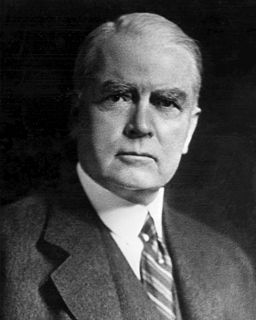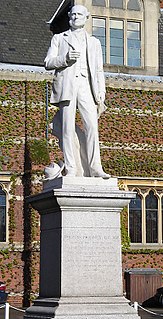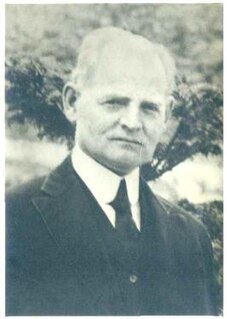Related Research Articles

A missionary is a member of a religious group sent into an area to promote their faith or perform ministries of service, such as education, literacy, social justice, health care, and economic development. The word "mission" originates from 1598 when the Jesuits sent members abroad, derived from the Latin missionem, meaning "act of sending" or mittere, meaning "to send". The word was used in light of its biblical usage; in the Latin translation of the Bible, Christ uses the word when sending the disciples to preach the gospel in his name. The term is most commonly used for Christian missions, but can be used for any creed or ideology.
This timeline of Christian missions chronicles the global expansion of Christianity through a listing of the most significant missionary outreach events.

The Nippon Sei Ko Kai, abbreviated as NSKK, or sometimes referred to in English as the Anglican Episcopal Church in Japan, is the national Christian church representing the Province of Japan within the Anglican Communion.

John Raleigh Mott was an evangelist and long-serving leader of the Young Men's Christian Association (YMCA) and the World Student Christian Federation (WSCF). He received the Nobel Peace Prize in 1946 for his work in establishing and strengthening international Protestant Christian student organizations that worked to promote peace. He shared the prize with Emily Balch. From 1895 until 1920 Mott was the General Secretary of the WSCF. Intimately involved in the formation of the World Council of Churches in 1948, that body elected him as a lifelong honorary President. His best-known book, The Evangelization of the World in this Generation, became a missionary slogan in the early 20th century.

James Hudson Taylor was a British Protestant Christian missionary to China and founder of the China Inland Mission. Taylor spent 51 years in China. The society that he began was responsible for bringing over 800 missionaries to the country who began 125 schools and directly resulted in 18,000 Christian conversions, as well as the establishment of more than 300 stations of work with more than 500 local helpers in all eighteen provinces.
OMF International is an international and interdenominational Protestant Christian missionary society with an international centre in Singapore. It was founded in Britain by Hudson Taylor on 25 June 1865.
The Church Mission Society (CMS), formerly known as the Church Missionary Society, is a British mission society working with the Anglican Communion and Protestant Christians around the world. Founded in 1799, CMS has attracted over nine thousand men and women to serve as mission partners during its 200-year history. The society has also given its name "CMS" to a number of daughter organisations around the world, including Australia and New Zealand, which have now become independent.
United Society Partners in the Gospel (USPG) is a United Kingdom-based charitable organization.
David Jacobus Bosch was an influential missiologist and theologian best known for his book Transforming Mission: Paradigm Shifts in Theology of Mission (1991) — a major work on post-colonial Christian mission. He was a member of the Dutch Reformed Church in South Africa (NGK). On Freedom Day, 27 April 2013, he posthumously received the Order of the Baobab from the President of South Africa "for his selfless struggle for equality ... and his dedication to community upliftment. By doing so, he lived the values of non-racialism against the mainstream of his own culture."

In the early 19th century, Western colonial expansion occurred at the same time as an evangelical revival – the Second Great Awakening – throughout the English-speaking world, leading to more overseas missionary activity. The nineteenth century became known as the Great Century of modern religious missions.

Muscular Christianity is a philosophical movement that originated in England in the mid-19th century, characterized by a belief in patriotic duty, discipline, self-sacrifice, manliness, and the moral and physical beauty of athleticism.
The Protestant Episcopal Church Mission was a Christian missionary initiative of the Episcopal Church that was involved in sending and providing financial support to lay and ordained mission workers in growing population centers in the west of the United States as well as overseas in China, Liberia and Japan during the second half of the 19th Century.
The Student Volunteer Movement for Foreign Missions was an organization founded in 1886 that sought to recruit college and university students in the United States for missionary service abroad. It also sought to publicize and encourage the missionary enterprise in general. Arthur Tappan Pierson was the primary early leader.
Missionary work of the Catholic Church has often been undertaken outside the geographically defined parishes and dioceses by religious orders who have people and material resources to spare, and some of which specialized in missions. Eventually, parishes and dioceses would be organized worldwide, often after an intermediate phase as an apostolic prefecture or apostolic vicariate. Catholic mission has predominantly been carried out by the Latin Church in practice.
Protestants in Japan constitute a religious minority of about 0.4% of total population or 509,668 people in number.
Christianity in the 20th century was characterized by an accelerating secularization of Western society, which had begun in the 19th century, and by the spread of Christianity to non-Western regions of the world.
Joseph Houldsworth Oldham (1874–1969), known as J. H. or Joe, was a Scottish missionary in India, who became a significant figure in Christian ecumenism, though never ordained in the United Free Church as he had wished.
Cheng Jingyi was a Chinese Protestant Christian leader who worked for an independent, unified Chinese Christian Church and a nondenominational unity of Christians in China. He received honorary doctorates from Knox College, Toronto, Canada (1916); the College of Wooster, Ohio, USA (1923); and St. John's University, Shanghai (1929). He died in Shanghai after his visit to the mission work in southwest China and Guizhou in 1939.

The Call is a novel published in 1985 by the American writer John Hersey. The novel, which is in the form of a fictionalized biography with letters and excerpts from Treadup's journal, presents the experience of David Treadup, an American Protestant missionary in China during the first half of the twentieth century. As the novel progresses, and China undergoes Japanese invasion and communist revolution, Treadup reconsiders whether his efforts to help China were useful and questions the usefulness of the Christian mission. Hersey based Treadup on a composite of six historical China missionaries, including his own father. Other historical figures appear, sometimes under their own names.

Robert Alexander Hardie was a Canadian physician and Methodist evangelist who for 45 years served as a missionary in Korea. He is recognized as the catalyst for the Wŏnsan Revival (1903) and also inspired the Great Pyongyang Revival (1907) in what is now North Korea.
References
- 1 2 Forman, Charles W. (1999). "Davis, J(ohn) Merle". In Gerald H. Anderson (ed.). Biographical Dictionary of Christian Missions. Wm. B. Eerdmans Publishing. p. 171. ISBN 978-0-8028-4680-8.
- 1 2 Shenk, Wilbert R., Davis, John Merle, in Religion Past and Present, 2006. ISBN 9789004146662. Online edition, 2011, accessed 6 October 2019.